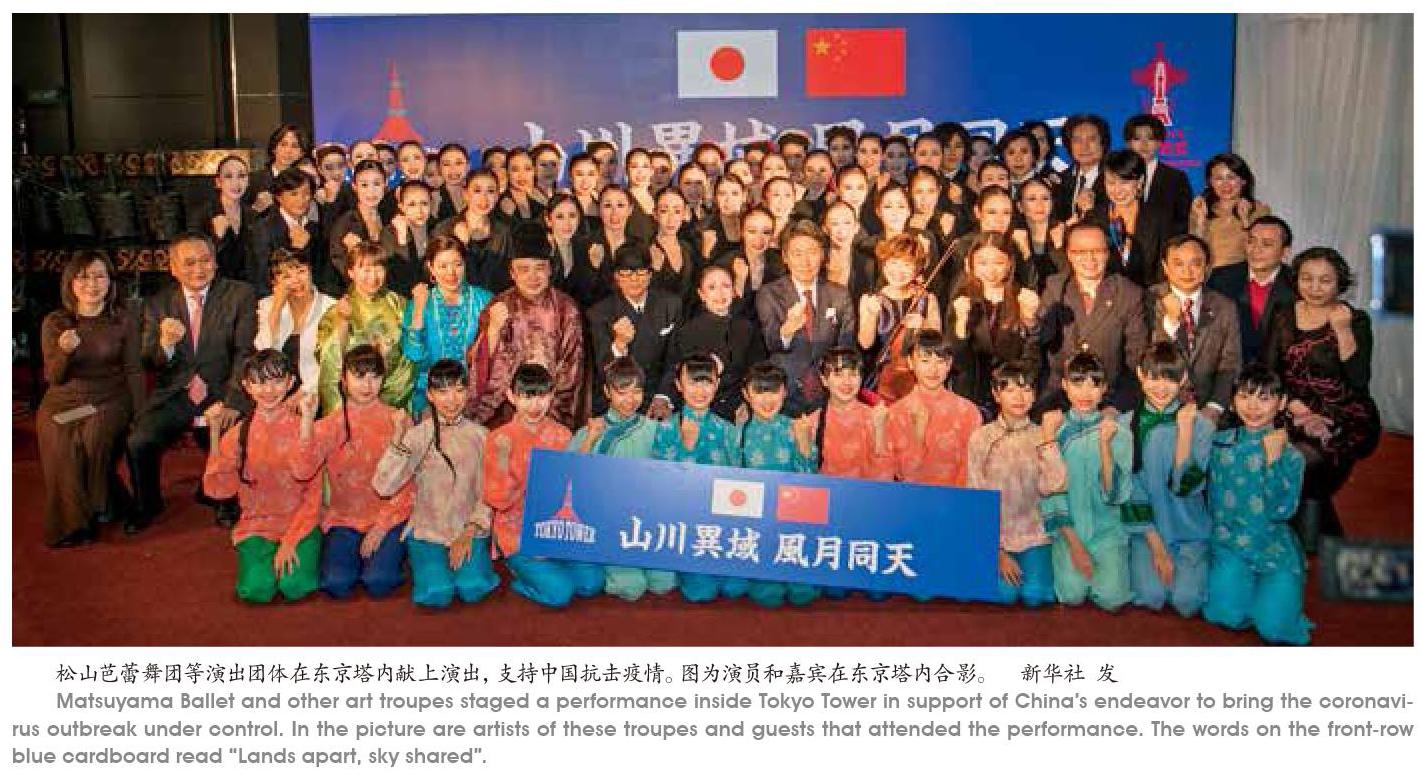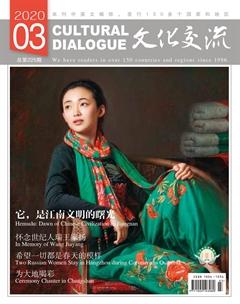这些古诗背后的中日情谊
宋浩


“山川异域,风月同天”“岂曰无衣,与子同裳”“青山一道同云雨,明月何曾是两乡”“此去与师谁共到,一船明月一帆风”……当古人写下这些优美的诗句时,恐怕想不到它们在数千年后会被如此准确地传达。
自新冠肺炎疫情在武汉暴发后,日本先后几次援助医疗用品,他们在包装箱上分别写下了这些诗句,以表达出最暖的鼓励和支持。
这些动人的留言,在带给中国人应对灾难的力量的同时,也让我们看到了超越国界的人文之美,更加理解了中日两国一衣带水的特殊关系。
八字背后的感人典故
“山川异域,风月同天”,八个字对仗很是工整。“域”是地,对“天”,“山川”对“风月”,意为我们不在同一个地方,未享同一片山川,但当我们抬头时,看到的是同一轮明月。
一个国度的山川地貌不能挪移,必然异于他国;而风月却是无边之物,不同国度的人皆可共见。
“山川异域,风月同天”这八个字背后的故事,和唐代东渡日本的鉴真和尚,以及日本长屋王有莫大的关联。
唐代,日本不断往中国派遣遣唐使交流学习。长屋亲王是日本当时的宰相,他曾命人制作千件袈裟送给大唐高僧们。这些袈裟上绣着四句话:“山川异域,风月同天,寄诸佛子,共结来缘。”鉴真禅师深受感动,于是泛海东渡日本传佛教。这则故事,在《唐大和上东征传》《唐扬州大云寺鉴真传》中都有记载。
開元二十一年(733年),日本第九次派“遣唐使”,队伍中有荣睿、普照两个和尚。二人受日本佛教界和朝廷的委托,邀请中国精通佛法的高僧去日本设坛。
据《唐大和上东征传校注》等文献记载,当时日本经过了“大化革新”之后,农民迫于赋税徭役,不少弃地逃亡,私自剃度为僧,把寺院作为避难所躲避课役,导致僧侣成分复杂,纪律废弛。而中国则有一套严格的戒律制度。日本亟需建立制度,于是派来了荣睿、普照。
据《唐扬州大云寺鉴真传》载,二人来到扬州请求鉴真:“我国在海之中,不知距齐州几千万里。虽有法而无传法人,譬犹终夜有求于幽室,非烛何见乎?愿师可能辍此方之利乐,为海东之导师乎!”
当时航海技术不发达,遣唐使也有不少丧生于大海的。鉴真的弟子面对这样的请求,认为“彼国太远,生命难存;沧海淼漫,百无一至”。而鉴真说:“是为法事也,何惜身命?诸人不去,我即去耳。”
鉴真历经千辛万苦,终于在天宝十二年第六次东渡成功,此时他已双目失明。日本朝野上下非常感激,孝谦天皇颁诏,封“传灯大法师”,在东大寺立戒坛。
“山川异域,风月同天。”1500年前,日本送来袈裟,带着这8个字。今天,日本送来了医疗物资,又带上这8个字。这8个字背后,是1500多年的中日友谊。
热血同裳的兄弟情
若说“山川异域,风月同天”是一种浪漫式的支持,那么“岂曰无衣,与子同裳”则是滚烫的热血鼓励。说白了,意思就是“怎么能说没有衣服呢?来,我们同穿一件!”
“岂曰无衣”,是先秦诗歌,出自《诗经·秦风·无衣》。据《左传》记载,鲁定公四年(公元前506年),吴国军队攻陷楚国的国都郢都,楚臣申包胥到秦国求援,“立依于庭墙而哭,日夜不绝声,勺饮不入口,七日,秦哀公为之赋《无衣》,九顿首而坐,秦师乃出”。于是一举击退了吴兵。
全诗如下:“岂曰无衣?与子同袍。王于兴师,修我戈矛,与子同仇!岂曰无衣?与子同泽。王于兴师,修我矛戟,与子偕作!岂曰无衣?与子同裳。王于兴师,修我甲兵,与子偕行。”
直译过来就是:“谁说我们贫穷,我们跟您一样也有战袍。要出兵打仗了,我们已经磨好了戈矛,君王啊,我们与您同仇敌忾,共同抗敌!”
这些话,只是平常的答话,可是写在纸上,便是一份言辞慷慨、情绪激昂的请战书,于是被秦人记录了下来,改写成了鼓舞斗志的歌。诗的语言质朴无华,但情绪是发自内心的,所以有震撼人心的力度,这是其流传千古的另一原因。
不过,历史上对这首诗的解读分两种——
以郑玄为代表的学者认为,这首诗是秦国人讽喻秦康公的,东周时,秦国秦康公好战,屡屡起兵打仗,秦国人写这首诗,说他穷兵黩武,平时不曾对百姓说过“与之同裳/袍”,只有打仗时才说“与子同仇”。
另一种是以朱熹为代表,认为秦人崇尚勇武,轻生忘死,所以军人之间会说“与子同裳/袍”,面对国家的战事,都奋勇百战,同仇敌忾。
水乳交融的中日文化
日本文化深受中国文化影响。隋唐时,日本人十分崇尚中国文化,很多日本人的文化修养也很高——比如长屋王;又比如曾与王维、李白知交甚深的晁衡,他写的“蓬莱乡路远,若木故园林”“平生一宝剑,留赠结交人”等汉诗,非常精彩。
同时,日本人也把中国的《诗经》、白居易等诗歌,以及宗教、建筑等文化带回日本。
在日本,还有一些我们都遗忘的古语在流传沿用,让我们在另一片土壤上看到另一个“文化的中国”。
指非写实的,却在人脑海中浮现,被描述或被记忆的风景。
転是“转”的日本汉字,指世间万事万物都在不停变化,片刻也不会停留。
群青,深蓝色;日和,晴天。即蔚蓝晴空的好天气。
指想尽孝时双亲已不在,与“树欲静而风不止,子欲养而亲不待”同源,出自汉代典籍《韩诗外传》。
无论是从哪个方向看这个人都是美人。也指那种谁都不得罪的人。
大自然的美好景色。
将绽放的花朵支撑起来的小小枝条。
世上常会的人也必有离散之时,相遇的人终究还是要分开。出自《佛遗教经》。
秋冬之际如同春天的暖和晴天。中国有“十月小阳春”。
酣睡之中,不知身边的事。白河是日本京都镰仓,这是产生自日本本土的词汇,但是是用中国成语的形式造出来的。
一辈子就一次的事物。
伝是“传”的日本汉字,指会心,心领神会。
形容蛙声和蝉声,使人听了厌烦,多用于形容众口喧闹或拙劣的议论或文章。
光阴似箭,时光飞逝。
比喻选择太多反而会无所适从。中国有“歧路亡羊”,出自《列子·说符》。
氷(bīng)同冰,是月下老人(月老)、冰人的合称,撮合男女姻缘的人,媒人。月老出自《续玄怪录》,冰人典出《晋书》。
在某件事物上投注上自己的生命。
指与爱的人离别的痛苦。在中国也用,出自佛经《《瑜伽师地论》。金代元好问有词“欢乐趣,离别苦,就中更有痴儿女。”
生同衾,死同穴。白头偕老和死同穴的组合。明代关汉卿《西厢记》也有“生则同衾,死则同穴”。
冬去春来,物换星移,在日本也指坏事情会向好事情转化。出自《易经》孔颖达疏。宋王安石《回贺冬启》有:“伏以四序密移,一阳来复。”
The Chinese civilization has proudly produced numerous beautiful poems, the authors of which may have never imagined how much positive energy these graceful words would bring to people living in modern times and struggling to win battles against the caprices of Nature, as has been vividly illustrated by the love and support sent from across the sea by the Japanese people.
Encapsulated in the messages written on the cartons of medical supplies sent to Wuhan is a love as mighty and eternal as the universe itself.
On some cartons was printed 山川異域, 风月同天 (One translation reads “Lands apart, sky shared”. Another reads “The destiny will finally bring us together, because we share the same sky”). This is part of a poem penned by Prince Nagaya of Japan in the 8th century. The prince had the poem embroidered on 1,000 Buddhist kasaya robes as gifts to China. The Japanese princes poem is in , the largest existing collection of Tang poetry which was put together in the Qing Dynasty (1644-1911). Another message is岂曰无衣, 与子同裳 (One translation reads “Fear not the want of armor, for mine is also yours to wear”), a quotation from , the most ancient Chinese poetry collection edited by Confucius (551-479BC) more than 2,500 years ago.
The love without borders, conveyed in these messages, cheered up all Chinese people not only in the sense of medical support but through the beauty and power of humanism that forever glorifies the China-Japan bond.
These two messages and many others have gone viral on all social media platforms in China and moved Chinese people in such a painfully critical time.
Behind one of these messages is a lesser-known story about how Prince Nagaya had inspired Monk Jianzhen (688-763), who in the Tang Dynasty (618-907) braved all the hardships to make his eastward voyages to Japan. He succeeded on the sixth attempt. His sitting statue is still enshrined and worshipped in Toshodai-ji Temple, Nara.
In the Tang times of China, many Japanese including diplomatic envoys to China, students and monks came to Chang'an, an international capital city. Many of these special envoys, determined to come to China to learn from the countrys well-established disciplines of Buddhism, drowned on the sea-crossing voyages. The lucky ones included two monks who eventually landed in Yangzhou, where they met with Jianzhen and talked about possibilities of the latter preaching Buddhism in Japan.
岂曰无衣, 与子同裳, or “Fear not the want of armor, for mine is also yours to wear” in English, is from , under the title “” (meaning “having no armors to wear”). The verse was created by the King of Qin after he heard the weeping of an envoy sent by the Chu State. “You are not fighting alone!” The king wrote a heartwarming poem to boost the morale of the Chu troops who had by that time had lost the capital city to their rivals. The Chu State eventually turned the tables.
The Chinese culture plays a pivotal part in the evolution of Japanese culture, as is fully demonstrated in almost all aspects of the life of the Japanese people.
Classical Chinese poetry has far-reaching impact on the literary tradition of Japan, and spawned beautiful communication between Chinese poetry masters, such as Li Bai (701-762), and their counterparts in Japan. The Japanese are such big fans of the literary magic of Chinese characters that what have long been forgotten by modern Chinese people is still cherished and used by the Japanese today. In this sense, it is no exaggeration to say that in modern times the dazzling glamour and profundity of ancient Chinese is more celebrated in Japan than in its birthplace. A case in point is the many ways ancient Chinese is used in the Japanese language, either in everyday life of commoners or in the literary world. It is easy to notice that many literarily beautiful expressions in the Japanese language are invented by Chinese men of letters and master monks in ancient times, but are rarely seen in modern Chinese literary world.
Take “一期一會” for example. Widely used among Japanese, it is the Japanese way of saying “once in a lifetime”. The phrase also suggests a strong “Zen” feel. Another example多岐亡羊, (literarily, you dont know which way to go to find a lost sheep at a crossroads), is an idiom created from a story in to warn the hazard of having too many options to know which one to take.
All these charming idioms and phrases are shining like stars in the sky of modern Japanese culture, reminding todays Chinese people of the immeasurable charisma of ancient Chinese literature and classics.

